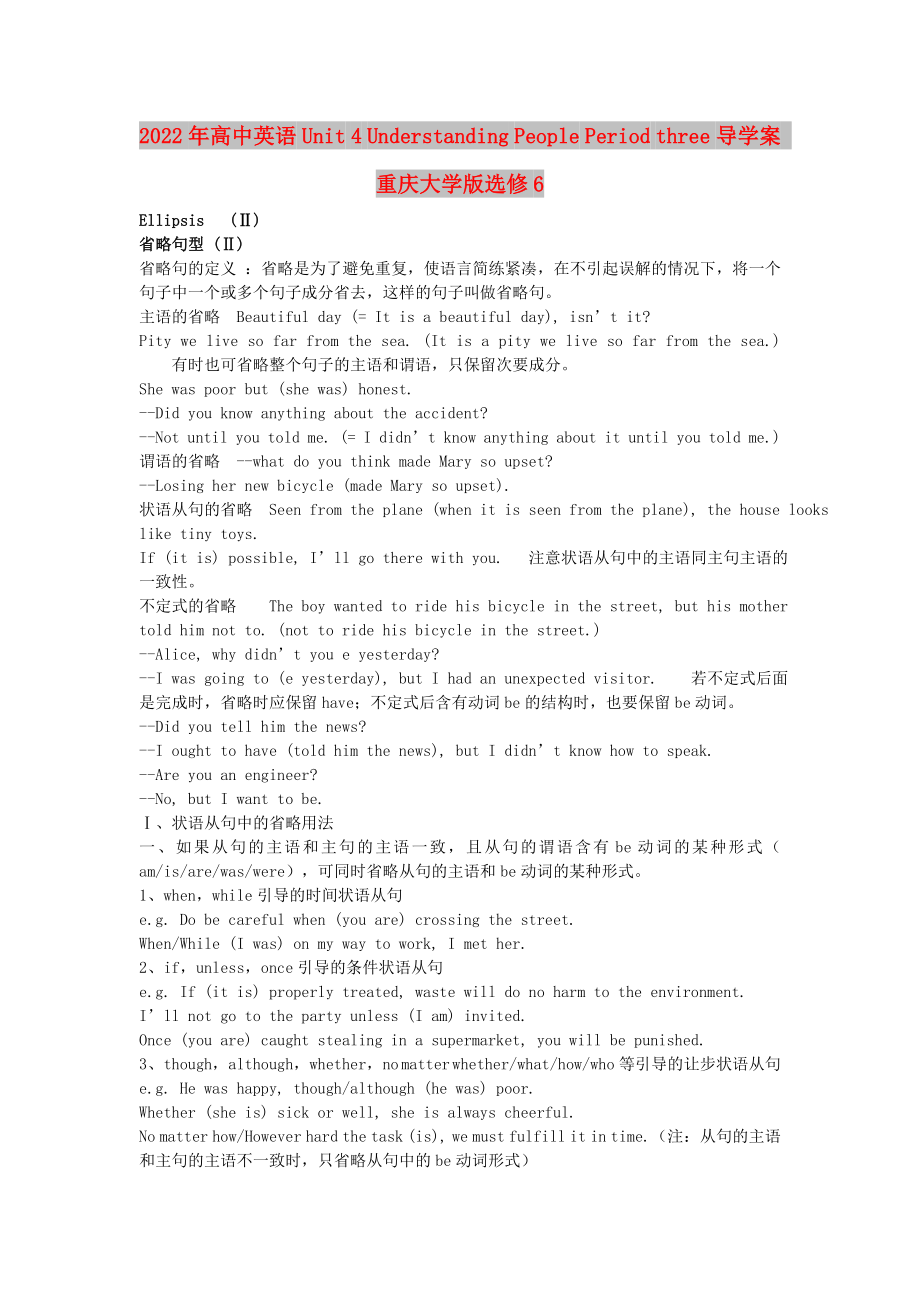《2022年高中英語(yǔ) Unit 4 Understanding People Period three導(dǎo)學(xué)案 重慶大學(xué)版選修6》由會(huì)員分享���,可在線閱讀�����,更多相關(guān)《2022年高中英語(yǔ) Unit 4 Understanding People Period three導(dǎo)學(xué)案 重慶大學(xué)版選修6(3頁(yè)珍藏版)》請(qǐng)?jiān)谘b配圖網(wǎng)上搜索。
1��、2022年高中英語(yǔ) Unit 4 Understanding People Period three導(dǎo)學(xué)案 重慶大學(xué)版選修6
Ellipsis (Ⅱ)
省略句型 (Ⅱ)
省略句的定義 :省略是為了避免重復(fù)�����,使語(yǔ)言簡(jiǎn)練緊湊�,在不引起誤解的情況下�����,將一個(gè)句子中一個(gè)或多個(gè)句子成分省去�,這樣的句子叫做省略句����。
主語(yǔ)的省略 Beautiful day (= It is a beautiful day), isn’t it?
Pity we live so far from the sea. (It is a pity we live so far from the sea.) 有時(shí)也可省略
2����、整個(gè)句子的主語(yǔ)和謂語(yǔ)�,只保留次要成分。
She was poor but (she was) honest.
--Did you know anything about the accident?
--Not until you told me. (= I didn’t know anything about it until you told me.)
謂語(yǔ)的省略 --what do you think made Mary so upset?
--Losing her new bicycle (made Mary so upset).
狀語(yǔ)從句的省略 Seen from the
3���、plane (when it is seen from the plane), the house looks like tiny toys.
If (it is) possible, I’ll go there with you. 注意狀語(yǔ)從句中的主語(yǔ)同主句主語(yǔ)的一致性�����。
不定式的省略 The boy wanted to ride his bicycle in the street, but his mother told him not to. (not to ride his bicycle in the street.)
--Alice, why didn’t you e yes
4、terday?
--I was going to (e yesterday), but I had an unexpected visitor. 若不定式后面是完成時(shí)���,省略時(shí)應(yīng)保留have�����;不定式后含有動(dòng)詞be的結(jié)構(gòu)時(shí),也要保留be動(dòng)詞��。
--Did you tell him the news?
--I ought to have (told him the news), but I didn’t know how to speak.
--Are you an engineer?
--No, but I want to be.
Ⅰ���、狀語(yǔ)從句中的省略用法
一、如果從句的主語(yǔ)和主句的
5����、主語(yǔ)一致,且從句的謂語(yǔ)含有be動(dòng)詞的某種形式(am/is/are/was/were)����,可同時(shí)省略從句的主語(yǔ)和be動(dòng)詞的某種形式�����。
1�����、when�,while引導(dǎo)的時(shí)間狀語(yǔ)從句
e.g. Do be careful when (you are) crossing the street.
When/While (I was) on my way to work, I met her.
2�����、if���,unless,once引導(dǎo)的條件狀語(yǔ)從句
e.g. If (it is) properly treated, waste will do no harm to the environment.
I
6����、’ll not go to the party unless (I am) invited.
Once (you are) caught stealing in a supermarket, you will be punished.
3����、though,although���,whether�����,no matter whether/what/how/who等引導(dǎo)的讓步狀語(yǔ)從句
e.g. He was happy, though/although (he was) poor.
Whether (she is) sick or well, she is always cheerful.
No ma
7、tter how/However hard the task (is), we must fulfill it in time.(注:從句的主語(yǔ)和主句的主語(yǔ)不一致時(shí)��,只省略從句中的be動(dòng)詞形式)
4��、as if,as though引導(dǎo)的方式狀語(yǔ)從句e.g. He rubbed his eyes and yawned as if/though (he was) waking up after a long sleep.
He stood up as if/though (he wanted) to leave.(as if/though + to do表示一個(gè)將來(lái)的動(dòng)作)
二、than���,a
8、s引導(dǎo)的比較狀語(yǔ)從句中的省略用法:
當(dāng)不同的主語(yǔ)進(jìn)行比較時(shí),一般省略從句中的謂語(yǔ)����;當(dāng)從句中的主語(yǔ)與謂語(yǔ)(be動(dòng)詞除外)和主句中的主語(yǔ)與謂語(yǔ)相同時(shí),通常省略從句中的主語(yǔ)和謂語(yǔ)��,只保留比較部分。
e.g. He is taller than his brother (is).
I have as much as confidence in you as (I have confidence) in him.
三�、以if從句為代表的狀語(yǔ)從句中的特殊省略用法:通常省略了it is��,that is�,there is/are����。
e.g. If (it is) possible/necessary
9�、, this old temple will be rebuilt.
If (that is) so, I will call you back at 5:00 pm.
There are only a few books in our school library, if (there are) any.
Ⅱ�、定語(yǔ)從句中的省略用法
關(guān)系詞的省略 關(guān)系代詞that,which���,whom等在限制性定語(yǔ)從句中充當(dāng)賓語(yǔ)且不位于介詞之后時(shí),可以省略����;in which或that在先行詞way后作方式狀語(yǔ)從句時(shí)可省略。
e.g. The man (that/who/whom) you vis
10��、ited last night is my grandpa.
I don’t like the way (in which/that) you treat the girl.
Ⅲ�����、虛擬語(yǔ)氣中if及should的省略
1�����、當(dāng)條件狀語(yǔ)從句中有were,had��,should等時(shí)省略if�,把它們提至句首�����,形成倒裝句�����。
e.g. If I were a teacher, I would be strict with my students.
= Were I a teacher, I would be strict with my students.
2�、Suggest���,insist�,ord
11�、er����,require等表示建議���、要求�����、命令的動(dòng)詞后接的名詞性從句中��,謂語(yǔ)動(dòng)詞常用“should+動(dòng)詞原形”�,should可以省略。
e.g. The doctor suggested that he (should) try to lose weight.
Ⅳ���、不定式符號(hào)to的省略
1�、感官動(dòng)詞see����,hear�,feel��,watch等和使役動(dòng)詞have���,make�����,let等后接不定式作賓語(yǔ)時(shí)�����,不定式省略to���。
2�、do nothing but,can’t help but等結(jié)構(gòu)常接省略to的不定式。
e.g. We didn’t do anything but stay at home
12�、 watching TV yesterday.
Hearing the news, she couldn’t help but cry.
3�、在特定語(yǔ)境中為了避免重復(fù),當(dāng)不定式再次出現(xiàn)時(shí),在want���,wish,hope�����,try,plan��,like�����,love,hate后往往只保留to�,而省略后面的動(dòng)詞。但不定式后有be�����,have時(shí)�����,也保留be和have���。
e.g. My parents encouraged me to go to college, but I didn’t want to.
Ⅴ��、so和not的替代性省略
用于避免重復(fù)前面所說(shuō)過的內(nèi)容�,替代詞so/not替代肯定或否定的
13、名詞性從句?���?膳cbelieve,do��,expect,fear,guess�����,hope,say,speak,suppose��,
think�����,I’m afraid等連用
e.g. – Do you suppose he is going to attend the meeting?
– I suppose not.
Ⅵ、日常交際中的省略
在情景會(huì)話中����,答語(yǔ)常常省略不會(huì)引起歧義的主語(yǔ)、謂語(yǔ)或賓語(yǔ)部分���,而只保留對(duì)方希望了解的內(nèi)容��。在復(fù)合句或并列句中����,也有省略主����、謂、賓的情況���。
e.g. – How many copies do you want?
-- (I want) Three cop
14、ies, please.
-- Have you ever been to the Great Wall?
-- No, (I have) never (been to the Great Wall).
【當(dāng)堂檢】
1.—Do you think it’s going to rain over the weekend?
—___ ____.
A.I don’t believe. B. I believe not so.
C.I believe it. D. I believe not.
2._______for the free ticket, I would not
15�、 have gone to the films so often.
A.If it is not B.Were it not C. Had it not been D.If there were to
3.—You ought to have given them some advice.
—________,but who cared what I asked?
A. So it was B. So I ought to have C. So I did D. So I ought to
4.The research is so designed that once________ nothing can be done to change it.
A. begins B. having begun C. beginning D. Begun
 2022年高中英語(yǔ) Unit 4 Understanding People Period three導(dǎo)學(xué)案 重慶大學(xué)版選修6
2022年高中英語(yǔ) Unit 4 Understanding People Period three導(dǎo)學(xué)案 重慶大學(xué)版選修6

